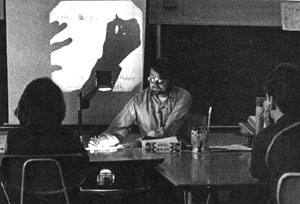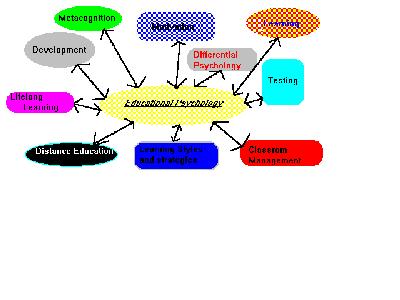
This web site was created for use by students in PSY 501. The material on these pages is not intended for use by individuals not enrolled in that course. |


Educational Psychology has a rich and varied history. In 1903 E. L. Thorndike published the first edition of Educational Psychology in which he described educational psychologists as "middlemen mediating between the science of psychology and the art of teaching". In some ways the study of Educational Psychology is deceptively simple, it is the application of psychological principles to the domain of teaching and learning. However, the breadth of knowledge an individual must possess to do this proficiently is staggering, and becoming more so every day.
Educational Psychologists must be familiar with the traditional approaches to the study of behavior, the humanistic, behavioral, cognitive and psychoanalytic orientations. They must be aware of the theories and pure research emanating from the traditional branches of psychology such as development (theorists like Piaget, Erikson, Kohlberg and Freud), linguistics (works of Vygotsky and Chomsky), motivation (Hull, Lewin, Maslow, and McClelland), testing (intelligence and personality) and test interpretation. The Educational Psychologist must also stay abreast of emerging developments in the areas of classroom management and instructional design, measurement and use of learning styles and strategies, research into metacognition, issues surrounding mainstreaming, increasing use of distance education, and advances in the development and application of technology for instructional purposes. As if this charge were not enough, the Educational Psychologist must be able to apply the research findings from all of these areas to the classroom and attempt to impart declarative knowledge to students, at the same time preparing them to assume roles as life long learners in a future which no one can predict.
The incorporation of information from all of these areas requires the teacher to be a master strategist and tactician, capable of developing plans, yet remaining flexible enough to adapt them extemporaneously as the student, content or situation demands. In fact, William James, one of the originators of the study of psychology compared teaching to warfare: "In war, all you have to do is to work your enemy into a position in which the natural obstacles prevent him from escaping if he tries to; then to fall on him in numbers superior to his own... Just so in teaching, you must simply work your pupil into such a state of interest - with every other object of attention banished from his mind; then reveal it to him so impressively that he will remember it to his dying day; and finally fill him with devouring curiosity to know what the next steps are " (James, 1958, p.25).
With such a broad knowledge base it is not surprizing that there is a wealth of materials designed to introduce individuals to the field of Educational Psychology. These resources take a variety of approaches and address different audiences. There is sure to be some reference that is appropriate for anyone interested in this domain.